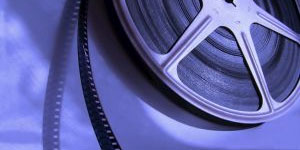- Home >
- Cinema & Film >
- Bright Young Things Film Review
Bright Young Things (15)


Stephen Fry






Running time: 104 mins
Impressively written and directed by Stephen Fry, this is an enjoyable satirical comedy with a superb young cast.
Bright Young Things is an adaptation of Evelyn Waugh’s satirical novel Vile Bodies and has been a pet project of writer-director Stephen Fry’s for several years. As such, anyone with pre-formed conceptions relating to the words “directed by Stephen Fry” should note the absence of Ben Elton, Tony Slattery, Emma Thompson, Hugh Laurie et al from the cast list.
This, then, is no Peter’s Friends-style luvvie-fest, although, to be fair, he HAS gone and cast a younger Hugh Laurie lookalike (Stephen Campbell Moore) in the lead role.
Sometime In The Thirties…
The film is set somewhere in the 1930s. Moore plays Adam, one of a set of wild, privileged, party-going creatures that the slavish press has dubbed the Bright Young Things. Although well-connected, Adam is completely broke and when Customs seize his newly-written novel he frantically tries to make enough money in order to marry his girlfriend Nina (Emily Mortimer).
Meanwhile, their hedonistic, sensation-seeking friends (including an outrageously camp Michael Sheen and loveably daffy Fenella Woolgar) all self-destruct as events spiral out of control.
Bright Young Things has a terrific cast of, well, Bright Young Things. Moore makes a splendid lead and, on occasion, genuinely seems to have stepped out of the 1930s, even if his Comedy Hugh Laurie Walk may cause you to double-take. Mortimer is good too, though her character is meant to be frustratingly vague and it’s hard to find her sympathetic.
Superb Cameos
The supporting cast, however, are wonderful. Woolgar and Sheen do their best to steal the show, but there are also splendid turns from Dan Aykroyd (as the media mogul), Peter O’Toole (a cameo as Mortimer’s dotty dad), Jim Broadbent (as The Drunken Major) and a vaguely subversive, wordless cameo by Sir John Mills as a doddery old duffer belatedly becoming a cocaine fiend.
It’s tempting to draw parallels with today’s vapid, celebrity-obsessed culture (the poster deliberately invites the comparison) but it’s safe to say that Fry feels a lot kinder towards these people than Waugh did. The script is frequently amusing, despite the odd blatant Fryism (such as “And you can call me Deirdre in public if I don’t”) which occasionally feels crow-barred in, since for the most part, the dialogue follows that of the novel. Similarly, the love story has been Hollywoodised a bit for cinema audiences, though it’s still startlingly cynical in places.
Problematic Ending
The main problem is the ending – the majority of the movie, like Waugh’s novel, is set in a fictional 1930s with a fictional Prime Minister (the novel was written in 1931) so when war breaks out in the novel, Waugh wasn’t thinking of the Second World War – however, when the familiar tones of Chamberlain’s declaration of war are heard in the film, it immediately places the movie in 1939, which has an extremely jarring effect on the atmosphere and pain-staking period detail of the rest of the film.
That said, Bright Young Things is still extremely enjoyable and sweeps you up in the lifestyle of the characters while never losing sight of the underlying sadness and desperation. It’s also extremely well cast and acted, though you can’t help feeling that it doesn’t really add up to much, which may well be the point. Worth seeing.
Film Trailer
Bright Young Things (15)Film Blog
This week Matthew Turner gives us his thoughts on the Total Recall film trailer, the A Kid with a Bike DVD release and all the latest film releases.
Film of the Week
A comedy drama slash musical about a pair of musicians going on a road trip.
Latest Close Up
The director behind Killer Joe talks about working with Matthew McConaughey and the notorious fried chicken scene.












